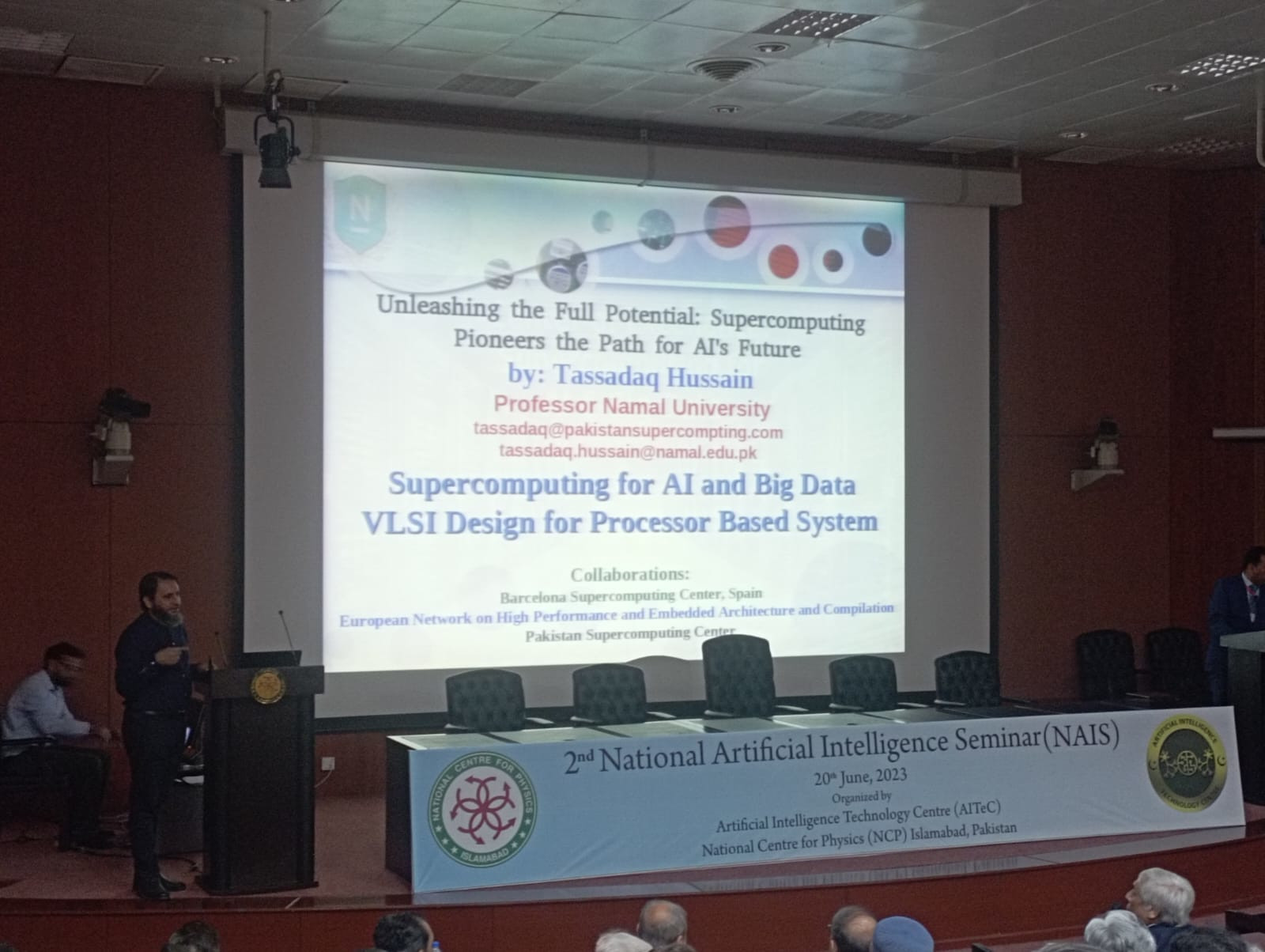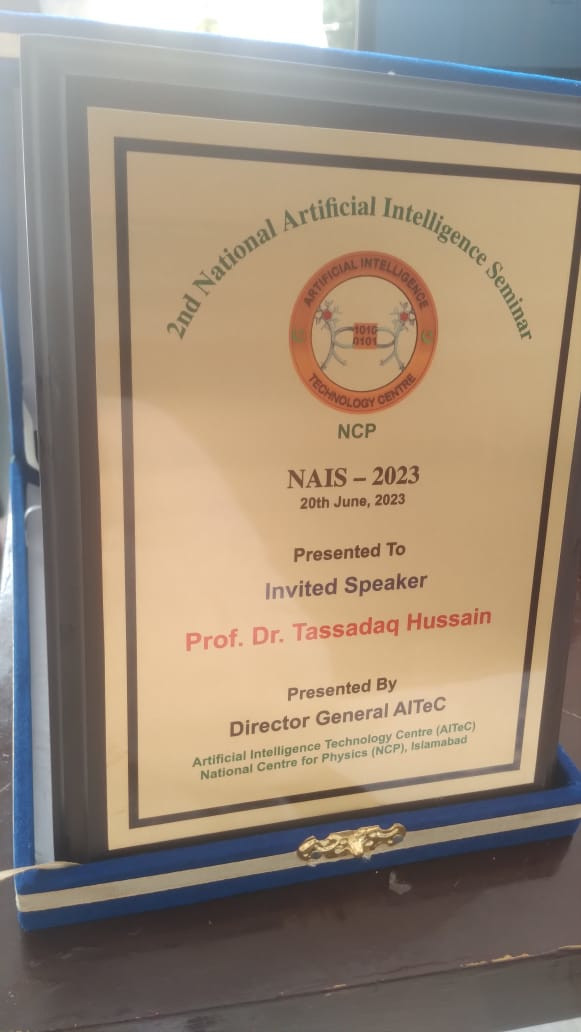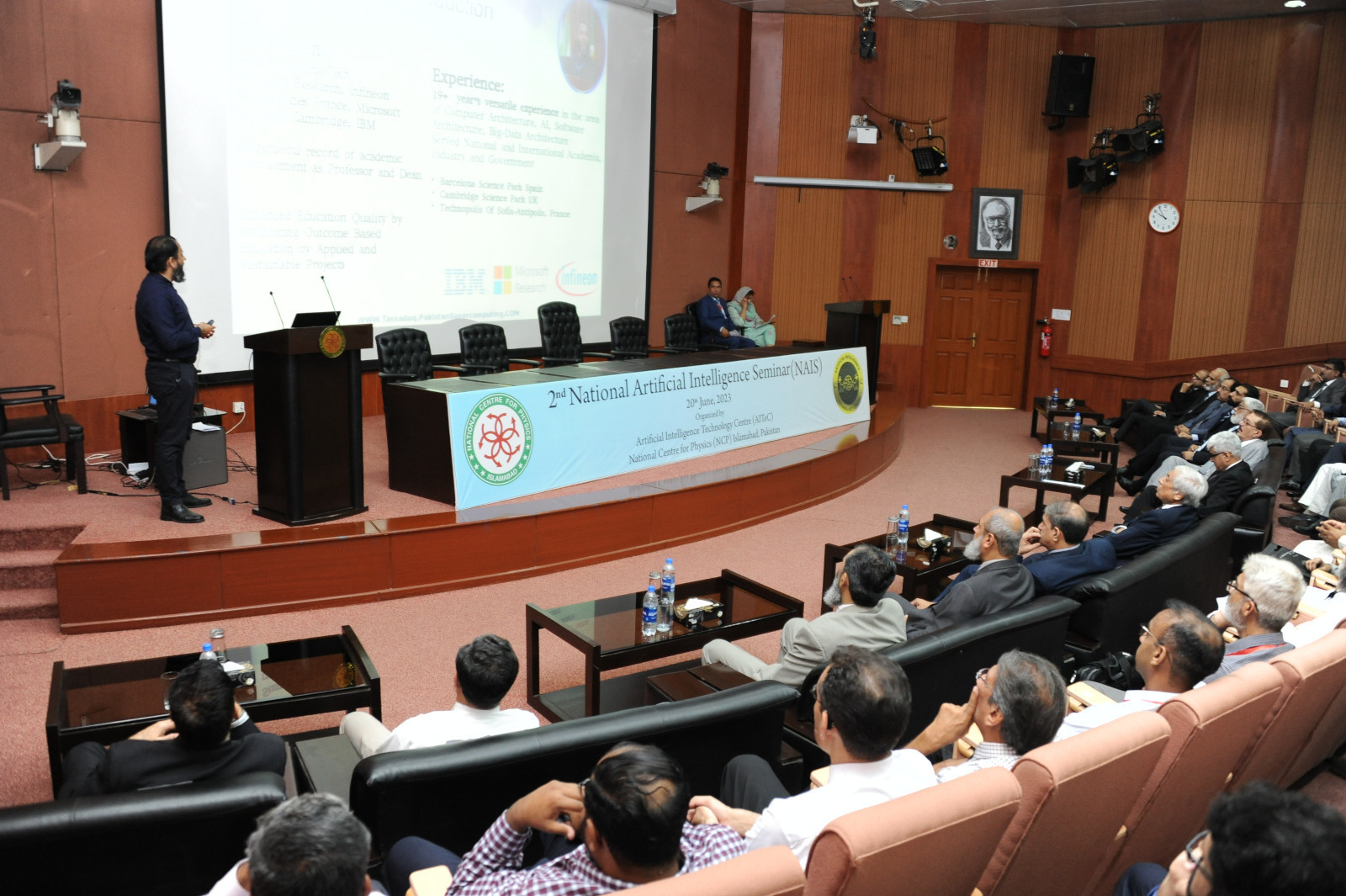UCERD and PakistanSupercomputing Presented in 2nd National AI Seminar at NCP AI Technology Center on 20th of June, 2023
Title: Unleashing the Full Potential: Supercomputing Pioneers the Path for AI's Future
Title: Unleashing the Full Potential: Supercomputing Pioneers the Path for AI's Future

UCERD Rawalpindi
Supercomputing Center
UCERD Murree
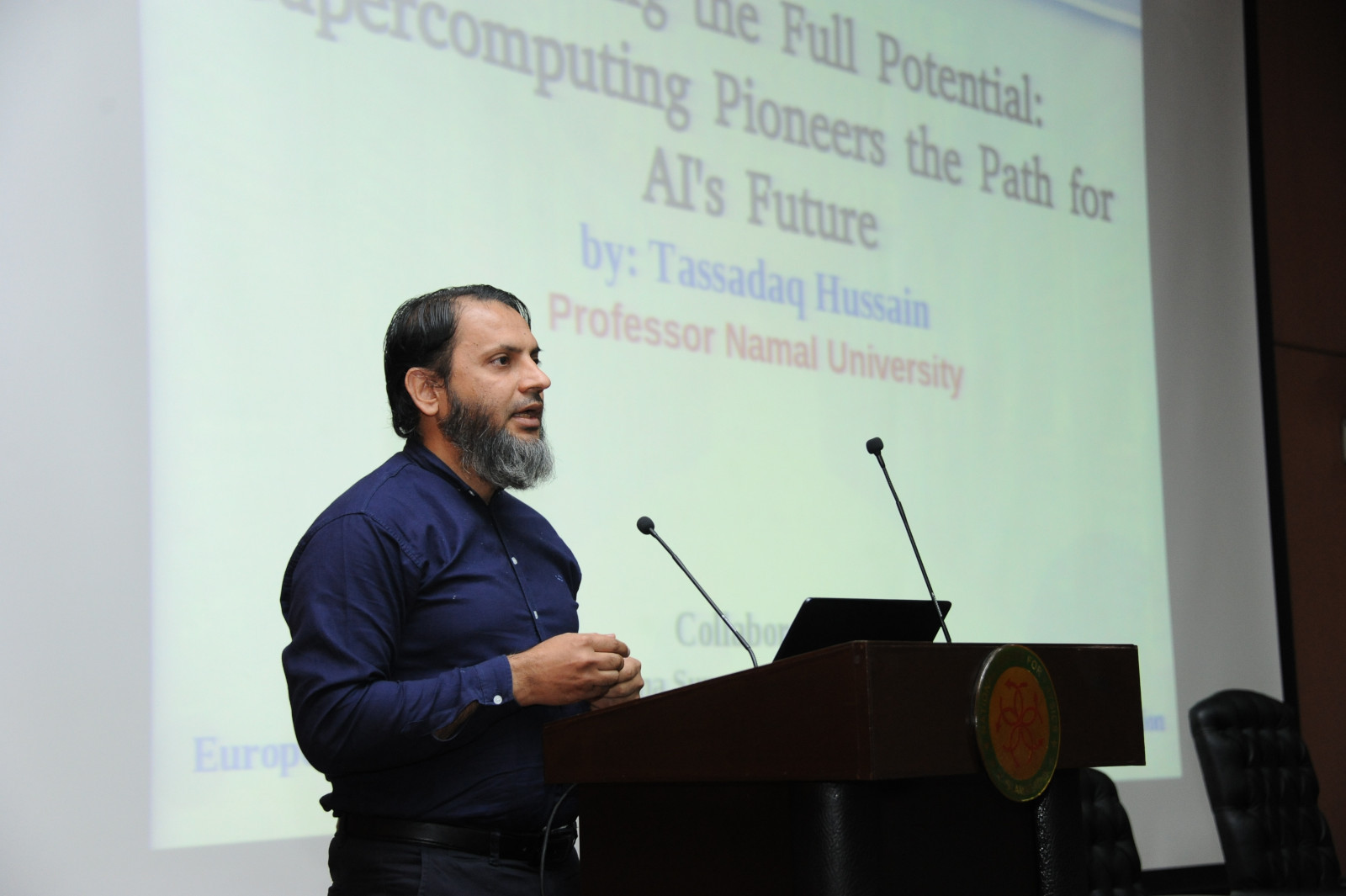
On the 20th of June, 2023, Dr. Tassadaq Hussain, Professor of Electrical Engineering at Namal University, delivered invited talk on "Unleashing the Full Potential: Supercomputing Pioneers the Path for AI's Future" at the NCP AI Technology Center during the 2nd National AI Seminar. Dr. Tassadaq emphasized that AI is going to be integrated into society, similar to electricity, and highlighted the crucial role of supercomputing systems in facilitating AI processing.

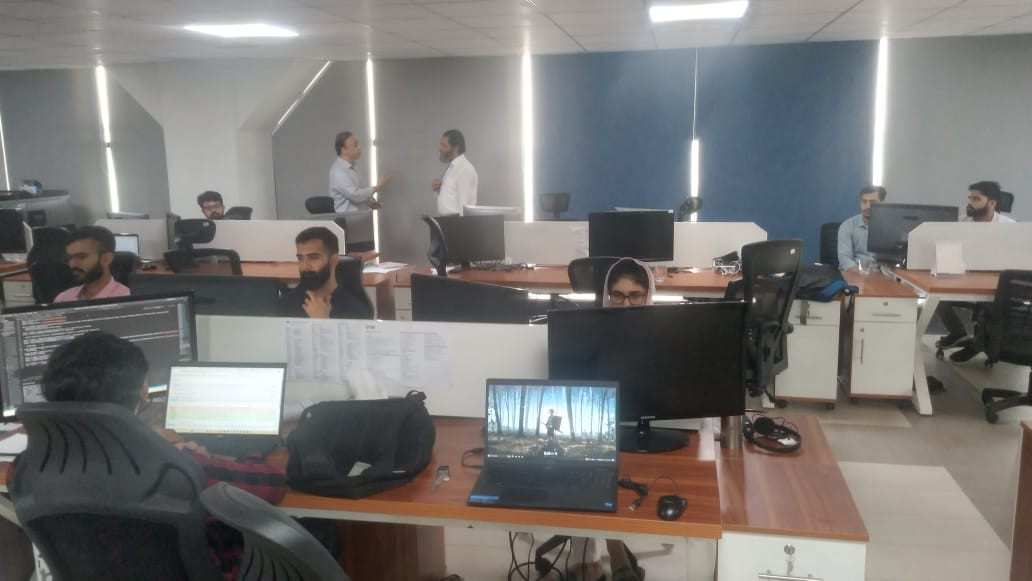
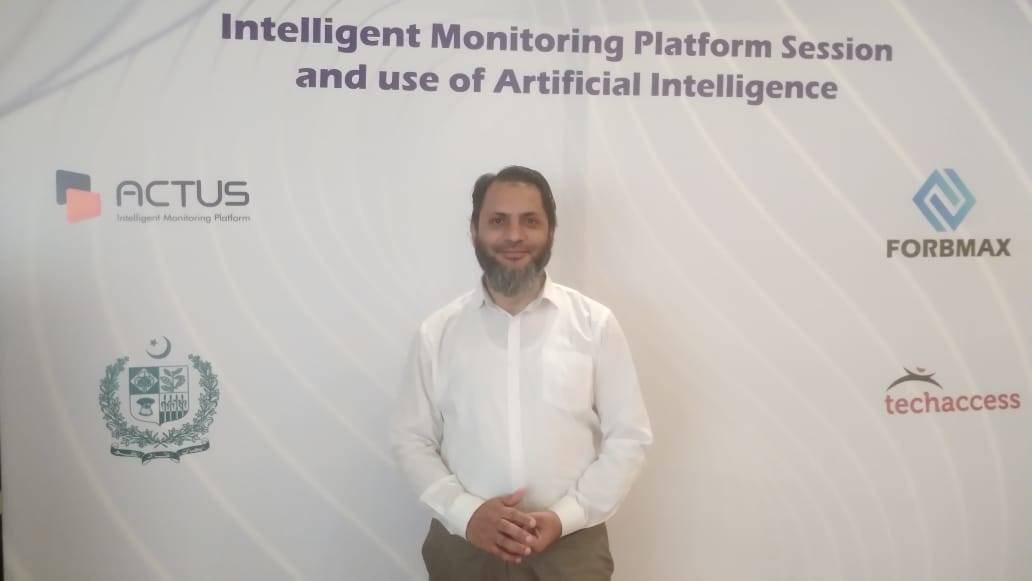
Pakistan Supercomputing showed expertise and secured agreements with government organizations and companies in two key areas:
a) Developing an OpenSource Full-Stack Ecosystem for the RISC-V Processor Architecture.
b) Establishing a Supercomputing Platform for Artificial Intelligence and Big-Data Applications.
a) Developing an OpenSource Full-Stack Ecosystem for the RISC-V Processor Architecture.
b) Establishing a Supercomputing Platform for Artificial Intelligence and Big-Data Applications.
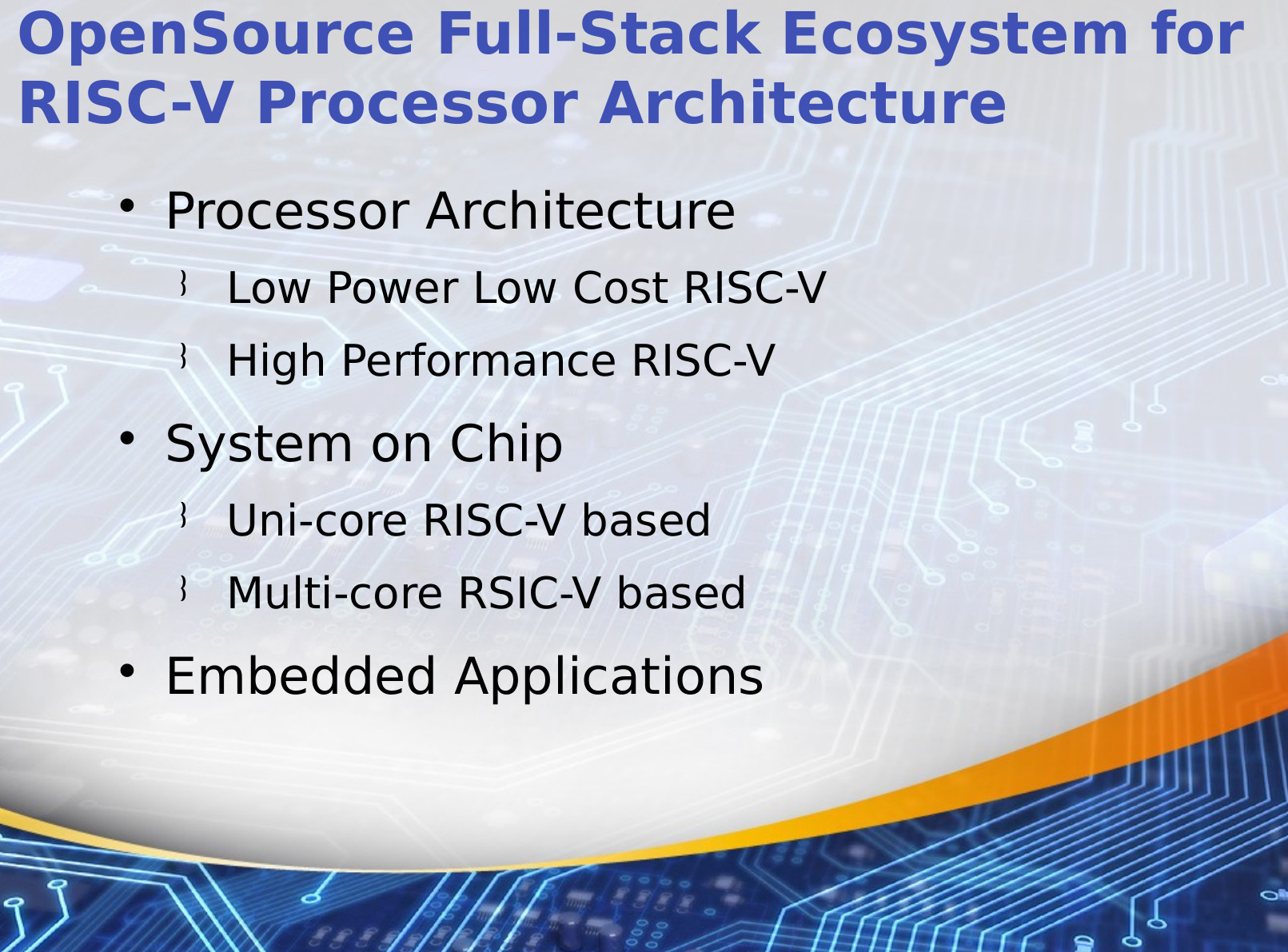
In Pakistan, the research and development of Supercomputing started during the early eighties. Pakistan Atomic Energy Commission (PAEC) department is considered as the pioneer in the field of supercomputing.
The PAEC started using supercomputing for processing complex applications. In the late nineties, Pakistan faces a ban on supercomputers which reduces the speed of development of supercomputing.
The ban gets relaxations at the start of the 21st century, the U.S. government eased regulations that applied to export high-performance computers to Pakistan. The current regulations allowed Pakistan to import supercomputer systems that are capable of processing information at a speed of 500 GFLOPS Later different universities and research centers have established their supercluster architectures. Some of the leading supercomputing groups and departments are ScREC NUST Islamabad, KUST Kohat, COMSATS, CIIT Islamabad, GIK Institute, KRL, UET Lahore, and NED Karachi.
The PAEC started using supercomputing for processing complex applications. In the late nineties, Pakistan faces a ban on supercomputers which reduces the speed of development of supercomputing.
The ban gets relaxations at the start of the 21st century, the U.S. government eased regulations that applied to export high-performance computers to Pakistan. The current regulations allowed Pakistan to import supercomputer systems that are capable of processing information at a speed of 500 GFLOPS Later different universities and research centers have established their supercluster architectures. Some of the leading supercomputing groups and departments are ScREC NUST Islamabad, KUST Kohat, COMSATS, CIIT Islamabad, GIK Institute, KRL, UET Lahore, and NED Karachi.
UCERD Pvt Ltd is one of leading Pakistani company giving HPC solutions.
UCERD provides hardware and software solutions for high performance computing. UCERD developed heterogeneous CPU/GPU based Supercomputer in 2015 and in 2019 won Higher Education Funding to develop Scalable Heterogeneous SUpercomputer System.
In 2017 UCERD developed Pakistan’s First FPGA-Powered Supercomputer System. The FPGA-Powered Supercomputer uses an FPGA and ARM processor-based compute nodes. The design system uses message passing interface libraries for communication between compute-nodes while AXI4-stream interfaces between the ARM processor and FPGA inside a compute-node. The system composed of low-cost and low power Zybo boards having Zynq SoCs. In the design system, the FPGA handle the computer-intensive portion of a high performance application and increased the computation power of the ARM CPU. The Finite Impulse Response (FIR) filter is used as a test application on the system to evaluate the computational capability of the ARM processor with and without FPGA accelerator.
Dr. Tassadaq Hussain [15] is the founder of Supercomputing Research Group (ScRG) [2] in collaboration with UCERD Private Limbed Islamabad [16] and Barcelona Supercomputing Centre Spain [17]. In January 2016, The ScRG team of engineers have developed a GP-GPU based supercomputer architecture [9]. The system supports CUDA, MPI/LAM, OpenMP, OpenCL, and OpenACC programming models. It also can solve larger algorithms, numerical techniques, big data, data mining, bioinformatics and genomics, business intelligence and analytics, climate, weather and ocean-related problems.
UCERD provides hardware and software solutions for high performance computing. UCERD developed heterogeneous CPU/GPU based Supercomputer in 2015 and in 2019 won Higher Education Funding to develop Scalable Heterogeneous SUpercomputer System.
In 2017 UCERD developed Pakistan’s First FPGA-Powered Supercomputer System. The FPGA-Powered Supercomputer uses an FPGA and ARM processor-based compute nodes. The design system uses message passing interface libraries for communication between compute-nodes while AXI4-stream interfaces between the ARM processor and FPGA inside a compute-node. The system composed of low-cost and low power Zybo boards having Zynq SoCs. In the design system, the FPGA handle the computer-intensive portion of a high performance application and increased the computation power of the ARM CPU. The Finite Impulse Response (FIR) filter is used as a test application on the system to evaluate the computational capability of the ARM processor with and without FPGA accelerator.
Dr. Tassadaq Hussain [15] is the founder of Supercomputing Research Group (ScRG) [2] in collaboration with UCERD Private Limbed Islamabad [16] and Barcelona Supercomputing Centre Spain [17]. In January 2016, The ScRG team of engineers have developed a GP-GPU based supercomputer architecture [9]. The system supports CUDA, MPI/LAM, OpenMP, OpenCL, and OpenACC programming models. It also can solve larger algorithms, numerical techniques, big data, data mining, bioinformatics and genomics, business intelligence and analytics, climate, weather and ocean-related problems.
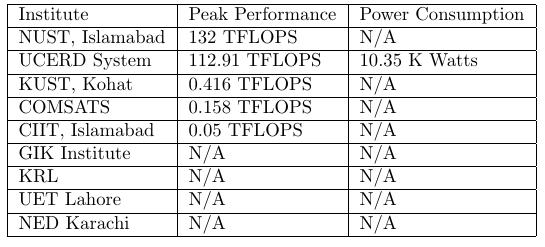
With the increase of information available in Big Data format and improvement in microprocessor technology, high performance, and low power Supercomputer architecture is required across all fields of research and academia. The Supercomputer architecture allows multiple processing resources to be accessible by different applications to processes datasets.
The Supercomputing Platforms harness the power of processing systems uses intelligent programming frameworks and provides the services to solve complex applications. The Supercomputing Platforms provide application services to solve scientific and engineering problems for academia, industry, and defense and gives them a productive environment. The Supercomputing programming frameworks allow developers, researchers, and scientists communities to write compute and data-intensive applications easily, solve problems in quick time and provide a guideline that improves their efficiency. It uses high performance processing cores to process compute and data-intensive real and non-real-time problems. The platform targets new computing processing architectures that are hardware optimized and give better support, artificial intelligence based programming environment and low power and high performance components to make supercomputer easily programmable, more energy efficient and high performance.
In 2015 UCERD team [4] built a Supercomputing Research Group (ScRG) [5] in collaboration with Barcelona Supercomputing Centre Spain [7].
The ScRG is one of the largest supercomputing research centers in Pakistan. The ScRG can work on research, industry and defense projects, including big data processing, signal processing, and low power computing. In the past, Dr. Tassadaq has proposed supercomputing architecture [11] [12] [13] [14] [15] [16] that uses FPGAs based accelerators, DSP, GPU
and RISC multi-core processing systems.
Considering the cost, power, and performance, Dr. Tassadaq has proposed and developed three types of Supercomputing Platforms.
The supercomputer architectures are the CPU based Supercomputer, the CPU-GPU based Supercomputer
and the FPGA based Supercomputer.
The Supercomputing Platforms harness the power of processing systems uses intelligent programming frameworks and provides the services to solve complex applications. The Supercomputing Platforms provide application services to solve scientific and engineering problems for academia, industry, and defense and gives them a productive environment. The Supercomputing programming frameworks allow developers, researchers, and scientists communities to write compute and data-intensive applications easily, solve problems in quick time and provide a guideline that improves their efficiency. It uses high performance processing cores to process compute and data-intensive real and non-real-time problems. The platform targets new computing processing architectures that are hardware optimized and give better support, artificial intelligence based programming environment and low power and high performance components to make supercomputer easily programmable, more energy efficient and high performance.
In 2015 UCERD team [4] built a Supercomputing Research Group (ScRG) [5] in collaboration with Barcelona Supercomputing Centre Spain [7].
The ScRG is one of the largest supercomputing research centers in Pakistan. The ScRG can work on research, industry and defense projects, including big data processing, signal processing, and low power computing. In the past, Dr. Tassadaq has proposed supercomputing architecture [11] [12] [13] [14] [15] [16] that uses FPGAs based accelerators, DSP, GPU
and RISC multi-core processing systems.
Considering the cost, power, and performance, Dr. Tassadaq has proposed and developed three types of Supercomputing Platforms.
The supercomputer architectures are the CPU based Supercomputer, the CPU-GPU based Supercomputer
and the FPGA based Supercomputer.
